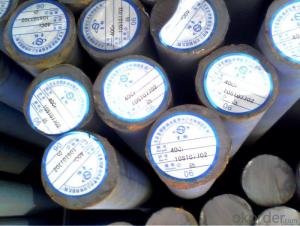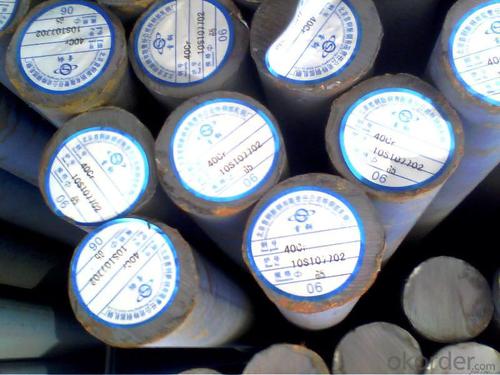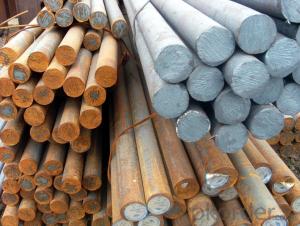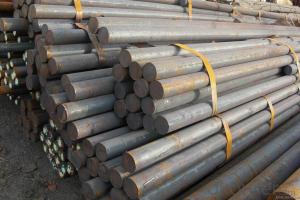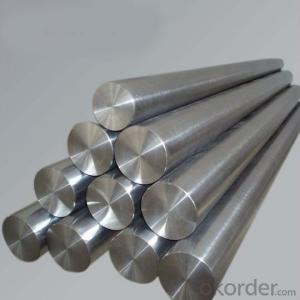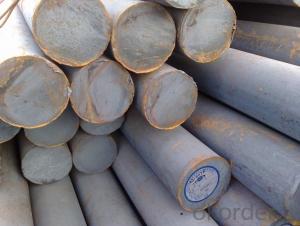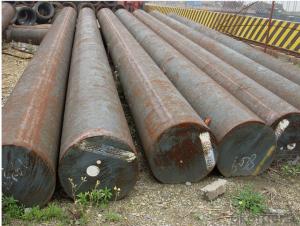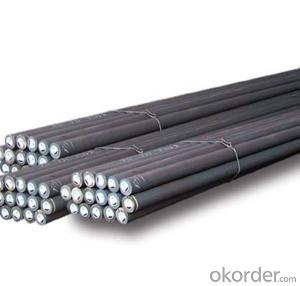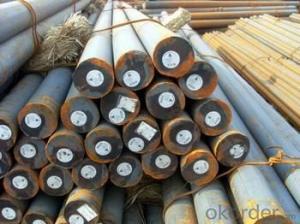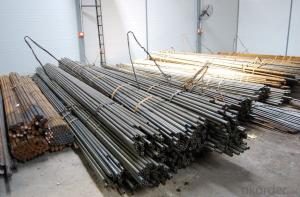Special Steel M2/6542/SKH9/1.3343 Round Bar Steel
- Loading Port:
- China main port
- Payment Terms:
- TT OR LC
- Min Order Qty:
- 25 m.t.
- Supply Capability:
- 10000 m.t./month
OKorder Service Pledge
OKorder Financial Service
You Might Also Like
Specification
Chemical Composition(GB)%
| Standard | C | Si | Mn | P | S | Cr | W | Mo | V |
| W6Mo5Cr4V2 | 0.55-0.65 | ≤0.40 | ≤0.60 | ≤0.030 | ≤0.020 | 3.70-4.30 | 6.00-7.00 | 4.50-5.50 | 1.70-1.10 |
| M2 | 0.78-0.88 | 0.20-0.45 | 0.15-0.40 | ≤0.030 | ≤0.030 | 3.75-4.50 | 5.50-6.75 | 4.50-5.50 | 1.75-2.20 |
Heat Treatment
| Item | Temperature℃ | Hardness |
| Anneal | 840-860 | ≤255HB |
| Quenching | 1150-1180 | ≥60HRC |
| Tempering | 560-580 | ≥60HRC |
Characterstics
| Good thermal plasticity |
| High abrasion resistance and red hardness |
Applications:Used for various tools,large thermoplastic forming cutting tools,abrasion resistance components operating under high load such as cold extrusion dies


1, Your advantages?
professional products inquiry, products knowledge train (for agents), smooth goods delivery, excellent customer solution proposale
2, Test & Certificate?
SGS test is available, customer inspection before shipping is welcome, third party inspection is no problem
3, Payment Terms?
30% TT as deposit and 70% before delivery.
Irrevocable L/C at sight.
4, Trading Terms?
EXW, FOB, CIF, FFR, CNF
6, After-sale Service?
We provides the services and support you need for every step of our cooperation. We're the business partner you can trust.
For any problem, please kindly contact us at any your convenient time.
We'll reply you in our first priority within 24 hours.
- Q: How is special steel machined?
- Special steel is machined using various techniques such as turning, milling, drilling, grinding, and cutting. These processes involve using specialized tools and equipment to shape and remove material from the steel, ensuring precise dimensions and smooth finishes. Additionally, advanced technologies like computer numerical control (CNC) machines are often used to automate the machining process, resulting in higher efficiency and accuracy.
- Q: What are the different applications of special steel in the construction industry?
- Special steels have a wide range of uses in the construction industry, serving as versatile materials. Structural components are one of the main applications of special steel in construction. Buildings, bridges, and infrastructure projects that require exceptional strength and durability often use special steels, including high-strength low-alloy (HSLA) steel and weathering steel. Apart from structural uses, special steel is extensively employed in pipeline construction. This is particularly significant for oil and gas pipelines, where corrosion resistance and the ability to withstand high-pressure conditions are vital. Stainless steel, for example, is commonly chosen due to its outstanding resistance to corrosion, which makes it ideal for harsh environments. Another important application of special steel in construction is the production of reinforcing bars, also known as rebars. Reinforcing steel bars reinforce concrete structures like buildings, bridges, and highways by adding strength to withstand tension forces. Special steel rebars, such as micro-alloyed steel or carbon steel, are designed specifically to enhance the durability and structural integrity of concrete structures. Furthermore, special steel is extensively used in the construction of high-rise buildings and skyscrapers. The exceptional strength, ductility, and fire resistance properties of special steels like carbon steel or alloy steel make them perfect for constructing tall structures capable of withstanding heavy loads and resisting fire incidents. Special steel also finds application in the construction of equipment and machinery used in the construction industry. For instance, high-speed steel (HSS) is commonly utilized in manufacturing cutting tools, drill bits, and saw blades, which are essential for various construction activities. HSS possesses exceptional hardness, wear resistance, and high-temperature strength, making it suitable for heavy-duty cutting and drilling applications. In conclusion, special steel is an essential material in the construction industry due to its superior strength, durability, corrosion resistance, and fire resistance properties. It serves various purposes in structural components, pipelines, reinforcing bars, high-rise buildings, and construction machinery. Special steel ensures the safety, longevity, and reliability of construction projects, making it indispensable in the industry.
- Q: How does special steel contribute to improving product reliability?
- Special steel contributes to improving product reliability in several ways. Firstly, special steel is known for its exceptional strength and durability, which enhances the overall performance and lifespan of various products. It can withstand heavy loads, resist wear and tear, and maintain its structural integrity even under extreme conditions. Secondly, special steels often possess excellent corrosion resistance properties, preventing rust and deterioration over time. This is particularly crucial for products exposed to moisture or harsh environments. Additionally, special steel allows for precise manufacturing and provides consistent material properties, ensuring the quality and reliability of the final product. By utilizing special steel, manufacturers can enhance the reliability of their products, offering customers a longer lifespan, reduced maintenance requirements, and increased safety and performance.
- Q: How is alloy steel used in the production of gears and shafts?
- Alloy steel is commonly used in the production of gears and shafts due to its excellent combination of strength, durability, and resistance to wear and corrosion. The alloying elements such as manganese, chromium, nickel, and molybdenum enhance the properties of the steel, making it suitable for high-stress applications. The use of alloy steel in gears and shafts ensures their ability to withstand heavy loads, transmit power efficiently, and maintain dimensional stability under extreme operating conditions, thus increasing the overall lifespan and performance of the components.
- Q: What is the impact of impurities on the properties of special steel?
- The presence of impurities in special steel can have significant impacts on its properties. Impurities can alter the steel's mechanical properties, such as strength, hardness, and toughness. They can also affect the steel's corrosion resistance and thermal conductivity. Additionally, impurities can lead to microstructural defects, such as grain boundaries or inclusions, which can further weaken the steel. Therefore, minimizing impurities is crucial in order to achieve high-quality special steel with desirable properties.
- Q: What are the different shot blasting techniques used for special steel?
- Some of the different shot blasting techniques used for special steel include wheel blasting, air blasting, and wet blasting. Wheel blasting involves using a high-speed rotating wheel to propel steel shot at the surface of the steel, removing any contaminants or rust. Air blasting uses compressed air to propel abrasive particles at high speed onto the surface of the steel, achieving a similar result. Wet blasting combines water with the abrasive particles to create a slurry, which is then sprayed onto the steel surface to remove any impurities effectively. These techniques are commonly employed to prepare special steel for further processing or to enhance its surface finish.
- Q: What are the advancements and trends in the field of special steel?
- In recent years, there have been significant advancements and emerging trends in the field of special steel. One major advancement is the development of high-strength and high-performance alloys, which offer improved mechanical properties and resistance to wear, corrosion, and extreme temperatures. Additionally, there has been a focus on the production of special steel with enhanced sustainability and reduced carbon footprint, in response to growing environmental concerns. Another trend is the increasing use of special steel in additive manufacturing or 3D printing, allowing for the creation of complex and customized components. Furthermore, the integration of digital technologies and automation in steel production processes has improved efficiency, quality control, and overall productivity. These advancements and trends in special steel continue to drive innovation and expand its applications across various industries, such as automotive, aerospace, energy, and construction.
- Q: How does special steel contribute to improved product aesthetics?
- Special steel contributes to improved product aesthetics in several ways. Firstly, special steel can be formulated to have a higher level of purity, resulting in a cleaner and more polished appearance. This enhances the overall visual appeal of the product. Additionally, special steel can be engineered to have unique surface finishes, such as brushed or mirror-like effects, which can add a sophisticated and luxurious touch to the product design. Furthermore, special steel can be shaped and molded with precision, allowing for intricate and intricate designs that enhance the aesthetics of the product. Overall, the use of special steel in manufacturing helps to elevate the visual appeal of products, making them more attractive and visually pleasing to consumers.
- Q: How is special steel used in the medical manufacturing process?
- Special steel is used in the medical manufacturing process for various applications such as surgical instruments, implants, and medical devices. Its unique properties, including corrosion resistance, strength, and biocompatibility, make it ideal for ensuring the quality, durability, and safety of medical equipment.
- Q: How does nitriding steel improve hardness and wear resistance?
- Nitriding steel improves hardness and wear resistance by introducing nitrogen into the steel's surface through a heat treatment process. This forms nitrides, which are hard compounds that increase the material's surface hardness. Additionally, the nitrogen atoms create compressive stresses within the structure, enhancing the material's resistance to wear and fatigue.
Send your message to us
Special Steel M2/6542/SKH9/1.3343 Round Bar Steel
- Loading Port:
- China main port
- Payment Terms:
- TT OR LC
- Min Order Qty:
- 25 m.t.
- Supply Capability:
- 10000 m.t./month
OKorder Service Pledge
OKorder Financial Service
Similar products
Hot products
Hot Searches
Related keywords
